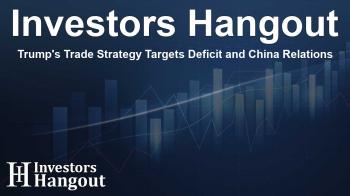Trump's Trade Strategy Targets Deficit and China Relations

Trump's Latest Trade Memo Addresses Key Issues
In a significant move, U.S. President Donald Trump is taking steps to confront the ongoing U.S. trade deficit. A draft trade memo that has surfaced indicates that he is instructing federal agencies to investigate these deficits thoroughly. The memo emphasizes the need to tackle unfair trade practices and currency manipulation employed by other nations.
Focus on China's Trade Agreements
This memo is particularly notable for its focus on China's compliance with the 2020 "Phase 1" trade deal. The agreement aimed to reduce trade tensions by requiring China to boost its purchases of U.S. exports by an impressive $200 billion over a two-year period. However, due to the impact of the COVID-19 pandemic, many of these commitments have not been fulfilled.
Assessing Compliance with the Trade Deal
The draft stipulates that federal agencies will conduct an assessment of China's adherence to the trading commitments laid out in the agreement. This assessment is crucial in determining if further enforcement actions or modifications to the deal are necessary.
Potential Further Actions Against Trade Deficits
While the memo does not outline any immediate new tariffs, it signals an encouragement for federal agencies to develop solutions for the trade deficits affecting the U.S. economy. Trump's administration is keen on ensuring that trade policies foster a more balanced playing field, particularly with major trade partners like China.
The Importance of Monitoring Trade Activities
The government's focus on monitoring trade activities aligns with a broader strategy to enhance economic conditions for U.S. businesses and workers. This aligns with Trump's narrative of prioritizing American interests in global trade discussions.
Conclusion: A New Chapter in U.S. Trade Policy
As the Trump administration continues to navigate complex international trade dynamics, this memo represents an important step towards a more assertive approach in managing relations with foreign governments, ensuring that the economic interests of the United States remain safeguarded.
Frequently Asked Questions
What is the main focus of Trump's trade memo?
The main focus is to investigate the U.S. trade deficit and assess China's compliance with its trade agreements.
How much were China’s exports to the U.S. supposed to increase?
China was required to increase purchases of U.S. exports by $200 billion over two years as part of the "Phase 1" trade deal.
What actions may be considered if China does not comply?
The memo indicates potential enforcement actions or modifications to the trade deal if compliance is not met.
Does the memo propose new tariffs immediately?
No, the memo does not outline any immediate new tariffs but encourages assessment and development of solutions.
Why is monitoring trade activities important?
Monitoring trade activities is crucial for addressing trade disparities and protecting U.S. economic interests.
About Investors Hangout
Investors Hangout is a leading online stock forum for financial discussion and learning, offering a wide range of free tools and resources. It draws in traders of all levels, who exchange market knowledge, investigate trading tactics, and keep an eye on industry developments in real time. Featuring financial articles, stock message boards, quotes, charts, company profiles, and live news updates. Through cooperative learning and a wealth of informational resources, it helps users from novices creating their first portfolios to experts honing their techniques. Join Investors Hangout today: https://investorshangout.com/
Disclaimer: The content of this article is solely for general informational purposes only; it does not represent legal, financial, or investment advice. Investors Hangout does not offer financial advice; the author is not a licensed financial advisor. Consult a qualified advisor before making any financial or investment decisions based on this article. The author's interpretation of publicly available data presented here; as a result, they should not be taken as advice to purchase, sell, or hold any securities mentioned or any other investments. If any of the material offered here is inaccurate, please contact us for corrections.
